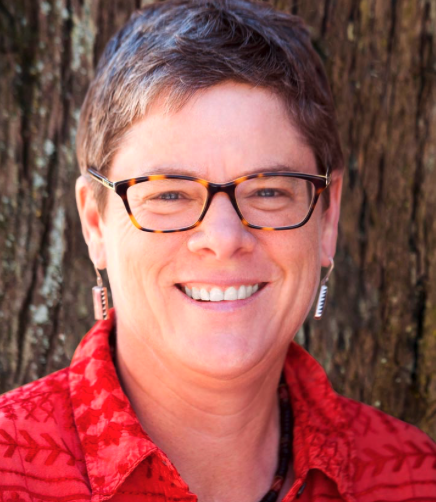From time to time a struggling client will say something like, “I want to go after wealthy (women, men, Martians), because they can afford to pay me.” Maybe you indulge in the same thoughts.
I get it. You want to bring in clients more easily. You want to stop hearing people tell you, “Well, I can’t really afford it right now.”
I always sigh and take a deep breath. On the surface it makes so much sense, “Thirsty? Go where there’s water.” But it just doesn’t work like that.
Unfortunately, you’ll hear the exact thing from someone with a fat wallet. Someone with a million dollars in their bank account will still tell you, with a straight face yet, that they “can’t afford it right now.” And they can’t. They way they have their money budgeted, they don’t have any money to spend on something they don’t want.
Just thinking about this topic takes me back in time… (the screen gets blurry, all kinds of wah-wah music, cut to a scene of the eighteen year-old me…)
Back in 1986, I was a volunteer with the Bethesda-Chevy Chase Rescue Squad. Aside from running around on ambulances and blanching when the lieutenant told me, “Silver, go get the finger” (a story for another time), we had to do fundraising.
You see, the BCCRS was and continues to be nearly completely self-funded, with very little cash coming from the government. Money was donated by people living in our response area during our annual campaign.
The annual campaign? Get in your uniform, grab a donation book, and hit the sidewalks, knocking on doors and asking for cashola. “Hi, I’m with the Bethesda-Chevy Chase Rescue Squad, and I’m here to ask for your support so we can continue to show up when you call 911.” A pretty darn compelling ask.
If you aren’t familiar with Bethesda and Chevy Chase, it’s an interesting area class-wise. It’s in Montgomery County, Maryland, which is one of the top ten wealthiest counties in the United States. Our response area covered both extremely wealthy neighborhoods, as well as blue collar and lower-income.
Here’s what I learned: in the poorer neighborhoods, people nearly always had a kind word and cash for you. Hardly anyone said no.
The rich neighborhoods? There were nice, generous people there, too. However, there were also long, wide gaps between the houses, so you had to do a lot more walking to cover many fewer houses.
And the houses themselves? Long driveways, locked gates, often no one was home. I can remember how many times I pushed a button at the end of a locked gate, and instead of being able to smile and look in someone’s eyes, a disembodied voice came out of the security speaker, “We’re not interested.”
I don’t remember the numbers, it was way back in 1986, and I was a clueless eighteen year-old, but I do remember bringing in a lot more money from the lower-income neighborhoods.
Why the Rich Are Rich
In the Millionaire Next Door, Thomas Stanley includes demographic research that explains how people who are wealthy stay wealthy by living below their means. In other words, just because someone has a great deal of money doesn’t mean they spend it more easily than someone who has a small deal of money.
In fact, they might spend it less easily.
You, of course, do want your clients to have their basic needs met. Food, shelter, clothing, enough so they can function a little higher on Maslow’s hierarchy pyramid. And if you’re offering truly premium products or services that cost tens of thousands of dollars, income absolutely plays a part in who can afford it.
If that’s not you, then please resist going after wealthy clients as a way to save you.
I Hate To Tell You This
There are no shortcuts. Wanting rich clients is just another version of Lottery Syndrome.
There’s nothing wrong with wanting ease and momentum in gaining clients. There’s nothing wrong with wanting clients who don’t flinch at the amount that nourishes you.
Although I could go into a bunch of tips here on how to get clients, I won’t. Instead, bookmark and read last week’s article. Or this one. Or this one.
For now, let’s indulge. What are some of your favorite escape or rescue fantasies in the world of business? Mine is: “The spiritual message just catches on like wildfire. Some little article I wrote goes viral without any effort, suddenly hundreds of thousands of people flood in, and we ride off into the sunset.”
Of course there are real steps to making that happen, but let’s not ruin it with that.
How about you? What’s your fav escape daydream?
p.s. Tired of living in a daydream?
We’re more than halfway through the Momentum course and it’s wonderful to see dozens of folks getting breakthroughs in their business. But I don’t want to just tease you.
We’re offering the home study of the Momentum Course. Well, actually it’s been out for a year, but we’re making a special offer now.
For the next week you can get the Momentum home study version with three cool things:
- A healthy during-the-live-course discount. (We changed the logo and the cover this year, and we have copies of last year’s home study left with the old cover. Same content, same everything, just a different cover.)
- All the Q&A PDFs from the current class, so you can read the extra questions and the answers I write in response
- In the premium version, you can get our Heart-Centered Article Writing home study course for a bit more.
Check it out: Momentum Home Study: Three Journeys to an Ongoing Flow of Clients and Money.







16 Responses
Great post, Mark. I have a friend who’s been trying to find “clients who can pay me” for a long, frustrating time. His target audience would say they loved what he was doing, but they couldn’t afford his $10,000 coaching program (most of them were stay-at-home or single moms on a tight budget trying to get a virtual business off the ground).
The solution? I suggested he and his wife start a membership site where they could offer one-to-many educational content (videos, audios, slide decks, etc…stuff with zero incremental cost to produce) for a few bucks a month and go for the large numbers. The site isn’t even finished, they’ve done zero marketing, and they already have their first few members.
The beauty is that, knowing the value of the content these two will offer their members, I’m sure many of the people who join the membership site because they “can’t afford” the full coaching program will begin to see success from the advice they’re getting and will upsell themselves…and they’ll find a way to afford it!
Thanks for sharing this post; I really appreciated it!
Jerry
Exactly- often we can come up with creative business models and offers that match out clients more easily. And thank you for your kind words.
Hey Mark,
I had a conversation with a prospective client yesterday who said “People just don’t pay the prices I charge for coaching”. She charges the exact same amount for coaching as me & right now, I’m finding clients are coming to me really easily (in very large part due to the great work I’m doing with the HoB organic business development programme – thanks!)
So it’s not about the money not being there, it’s about communicating the value of what we offer and how that directly meets the prospective client’s needs – and some.
I heard good advice once: “Don’t say ‘I can’t afford x’, say ‘it’s not a financial priority right now’ – it’s more empowering that way”. That feels like sound advice, and accurate. Same is true for our prospective clients – if solving this need is not a financial priority, or if they don’t trust that we can solve that need, then it doesn’t matter how much money they have, they won’t pass it on to us!
Thanks, as ever,
Corrina
It’s amazing to spot these interactions- you are rockin’ it and it’s no wonder you’re getting clients. And I hope that prospective client signed up with you- you’d turn’em around.
And I love that about “it’s not a financial priority right now”- thanks for reminding me of that. I said that just recently about some kitchen changes we’re making- it’s not a financial priority right now for us to spend a lot in the kitchen- so we’re doing much more minimal work so we can be happy.
Thanks dude – and yep, she did indeed in enroll in ‘Turn Your Passion To Profit’ & I fully intend to turn her round 😉
Happy minimal kitchen work! x
Not surprised! 🙂
Hi Mark,
I agree completely. Be the lighthouse and those that need your message will walk toward the light. There are coaches who promote working with the elite and offer ways to do that.
Yet, most of their clients are not the elite! Many spiritual disconnects out there …
Corrina’s got some great advice to work with groups that you’ve got your own interest in. I’ve done the same with good success too. You’re already with people who share a similar worldview. That does help!
Good info. Thank you.
Giulietta
Many spiritual disconnects out there… 🙂
I think it’s funny, because there’s a major difference between finding “likely buyers” and “people who can pay me”. As Corinna said, for many people it’s not a question of “can” or “can’t” it’s a question of “will” or “won’t”. Naomi Dunford has a great post on the subject: http://ittybiz.com/customers-cant-afford-it/ including a list of things that people who really have very little money do to make it happen.
But it is important to consider whether someone is likely to spend money on your thing–and how much savings, checking, or investment backup they have is rarely a good indicator. Thanks, Mark!
Yes- I loved that article by Naomi- and the “will” versus “can” is such an important distinction.
Namaste` Mark~ In the Momentum class you’ve taught us about niching; identifying who our client is and what it is that we can help them with. When we know our client, then we can offer our jewel in a manner that is accessible to those we’re desiring to serve.
You are right on about the consciousness of “hitting the lottery”. It can sneak up on even heart-centered individuals and temporarily we forget that the bottom line isn’t about money. It’s about exchange that works for both parties.
I used to think that my successful service to one particular client would become widely known and put me on the map.The Momentum training has me thinking in terms of how eager I am to build momentum…to build healthy systems for a sustainable service- oriented business. That’s my new dream, replacing the old fantasy.
Thanks for another insightful article.
I highly recommend the Momentum Class in it’s home study format. I’ve been able to accomplish the bulk of the assignments through the Momentum work book and having read and worked with “Unveiling the Heart of your Business Book”. I’m very pleased with the fast progress I’m making in getting the foundation for a new business laid down.
Blessings for truth, beauty and freedom, Joanna Pinney Buell
You are so welcome- and thanks for your kind words about the course.
Excellent… just forwarded it to the head and fundraising chair of our group that’s raising money for a progressive radio station here in San Diego.
Can confirm what you say from personal experience. I’ve been amazed at who actually pays for the ghostwriting of a book or an online class.
Love and blessings,
A
Thanks for forwarding it on, Anne- love to hear that.
I read this phrase in a review of Martha Stewart’s book about business – “If you appeal to the masses you dine with the classes. And if you reach for the classes you dine with the masses.”
There are a lot more “masses” than “classes”. And unless you are already rich, you are going to be able to get in their head much easier and relate.
Then there’s who you want to work for. Personally I like to aim for the high-end of the low-end, if that makes any sense.
I love it. And I love the “high-end of the low-end”- 🙂